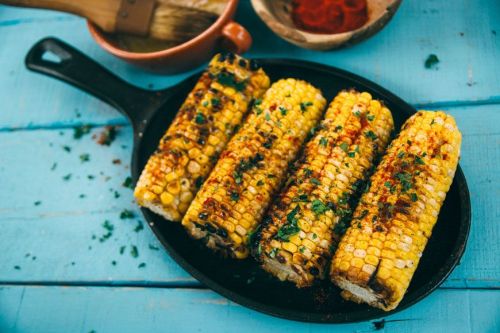Here’s why you might want to enjoy this beloved summer vegetable in moderation
According to a study from Harvard University, corn—a starchy vegetable—contributes to weight gain more than any other vegetable or fruit. But the summer barbecue staple still offers health benefits that are great to consume in moderation.

The onset of spring and summer often provides for rejuvenating effects. The time marks the end of the cold and dark months (which usher in seasonal affective disorder symptoms), an opportunity to literally shed layers in the form of heavy clothes, and the first chance to get outdoors for some fun in the sun. And let’s not forget the backyard barbecues and alfresco dining options that promote healthy grilled veggies over heavier winter meals. But before you fire up the grill, keep in mind that one summer-vegetable staple might actually hurt your health goals if you overindulge: corn.
A study published in PLOS Medicine in 2015 examined the long-term impact certain fruits and veggies had on weight gain. From 1986 to 2010, researchers from Harvard University examined the eating habits of more than 133,000 United States adults aged 25 to 75 (at the time of enrollment); every four years they administered questionnaires that asked participants to record what they ate every day for a week, and every two years they weighed the participants. Finally, the researchers compared that data to information from the USDA on the nutritional value of the food to find links between specific produce and weight.
Though loaded with nutrients like potassium, iron, and fiber, starchy vegetables also have a “higher glycemic load”—meaning they produce bigger and more frequent blood-sugar spikes.
People who ate more corn, potatoes, and peas—AKA starchy vegetables—were more likely to gain weight: Though loaded with nutrients like potassium, iron, and fiber, these items also have a “higher glycemic load”—meaning they produce bigger and more frequent blood-sugar spikes—which researchers said might be why they cause weight gain. Of these starchy vegetables, corn was shown to have the worst effects: Researchers found it led to two pounds gained per additional serving in a day (for potatoes, it was three quarters of a pound; for peas, just more than one pound).
Of course, this study doesn’t spell the end of summer corn on the cob or your favorite elote dish, but it’s something to keep in mind if you’re torn between your choice of sides as barbecue season gets underway. As with the best stuff in life, moderation is key. So, in case you’re still wondering, is corn good for you? Most dietitians will argue that it certainly is.
Make the most out of the seasonal veggies with hearts of palm pasta or this delicious purple potato galette.










